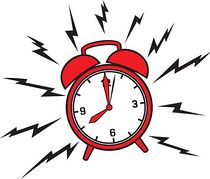As I write this blog post, I wonder how I will catch up on all the sleep I’m missing out on right now. Can I catch up on my sleep or will laying here awake at 3 in the morning cause some kind of permanent damage to my brain? How much extra will I have to sleep to make up these lost hours? These questions are all addressed in ASAPSciene’s video on sleep deprivation. Scientists actually studied the effects of sleep deprivation on mice and the results were fairly conclusive. If you fall behind on sleep for only a couple days in a row, your brain can recover quickly without any permanent damage. If you fall behind on a timescale of several weeks or months, the brain can recover, but it will take longer to recover than the amount of sleep lost. If you fall behind on sleep for a number if years, the brain will very likely never fully recover and you will see prolonged symptoms of being groggy or exhausted. 
Here’s where their report get interesting. The next topic they address is how much sleep is actually required for a good night. While I’m sure most of us are not getting the 7-8 hours recommended, it may not be a worst case scenario. Some of the possible side effects to not getting enough sleep can include increased chance of diabetes, heart disease, and even a 12% higher chance of death. Suprisingly, these chances can be even higher if you In fact get TOO MUCH sleep in one night. That scary 12% increased chance of death number jumps to an alarming 30%! So before you think of trying to sleep the day away, consider setting an alarm. It may just save your life.
If you routinely sleep less than 7-8 hours per night and feel no signs of sleep deprivation, turn around and pat yourself on the back because you are the exception. During the mice study, researchers found that some mice had genetic mutations that allowed them to sleep for less than the normal time and not suffer the consequences of missing sleep. This was linked to the fact that they had more intense sleep cycles that put them in deeper sleep and helped them recover quicker.


I also worry about the amount of sleep I lose to doing work, so I try to compensate for it by napping quite a bit. Although it’s fairly known that sleep deprivation can make you sick, I had no idea that too much sleep can do the same thing. Glad I read this post, I’ll definitely monitor the amount of sleep I get now.
With seeing a lot of blogs about sleep and sleep deprivation, I have to say that this blog was one of the better reads.
It’s 5 AM and I have plenty more blogging to do so this blog peeked my interest. I think that I may actually be one of those people that don’t need as much sleep, I routinely only sleep for around 5-6 hours. Also, I tend to feel less energized if I sleep more than 6 hours. This is very interesting, thanks for sharing.
I actually just did a blog on how much sleep is too much. I was also thinking the same thing when trying to pick a topic. If you were looking to get some more information on what oversleeping could do to your health check out my blog. I enjoyed reading your blog, good information and well written.